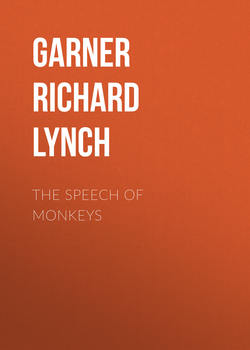The Speech of Monkeys

Реклама. ООО «ЛитРес», ИНН: 7719571260.
Оглавление
Garner Richard Lynch. The Speech of Monkeys
CHAPTER I
CHAPTER II
CHAPTER III
CHAPTER IV
CHAPTER V
CHAPTER VI
CHAPTER VII
CHAPTER VIII
CHAPTER IX
CHAPTER X
CHAPTER XI
CHAPTER XII
CHAPTER XIII
CHAPTER XIV
CHAPTER XV
CHAPTER XVI
CHAPTER XVII
CHAPTER XVIII
CHAPTER XIX
CHAPTER XX
CHAPTER XXI
CHAPTER XXII
CHAPTER XXIII
CHAPTER XXIV
CHAPTER XXV
CHAPTER XXVI
Отрывок из книги
From childhood, I have believed that all kinds of animals have some mode of speech by which they could talk among their own kind, and have often wondered why man had never tried to learn it. I often wondered how it occurred to man to whistle to a horse or dog instead of using some sound more like their own; and even yet I am at a loss to know how such a sound has ever become a fixed means of calling these animals. I was not alone in my belief that all animals had some way to make known to others some certain things; but to my mind the means had never been well defined.
About eight years ago, in the Cincinnati Zoological Garden, I was deeply impressed by the conduct of a number of monkeys occupying a cage with a huge, savage mandril, which they seemed very much to fear and dislike. By means of a wall, the cage was divided into two compartments, through which was a small doorway, just large enough to allow the occupants of the cage to pass from one room to the other. The inner compartment of the cage was used for their winter quarters and sleeping apartments; the outer, consisting simply of a well-constructed iron cage, was intended for exercise and summer occupancy. Every movement of this mandril seemed to be closely watched by the monkeys that were in a position to see him, and instantly reported to the others in the adjoining compartment. I watched them for hours, and felt assured that they had a form of speech by means of which they communicated with each other. During the time I remained, I discovered that a certain sound would invariably cause them to act in a certain way, and, in the course of my visit, I discovered that I could myself tell, by the sounds the monkeys would make, just what the mandril was doing – that is, I could tell whether he was asleep or whether he was moving about in his cage. Having interpreted one or two of these sounds, I felt inspired with the belief that I could learn them, and felt that the "key to the secret chamber" was within my grasp.
.....
In this case I noticed the defects which occurred in my work and provided against them, as well as I could, for the future. Soon after this I went to Chicago and Cincinnati, where I made a number of records of the sounds of a great number of monkeys, and among others I secured a splendid record of the two chimpanzees contained in the Cincinnati collection, which I brought home with me for study. The records that I made of various specimens of the Simian race I repeated to myself over and over, until I became familiar with them, and learned to imitate a few of them, mostly by the use of mechanical devices. After having accomplished this I returned to Chicago, and went at once to visit a small Capuchin monkey whose record had been my chief study. Standing near his cage, I imitated a sound which I had translated "milk," but from many tests I concluded it meant "food," which opinion has been somewhat modified by many later experiments which led me to believe that he uses it in a still wider sense. It is difficult to find any formula of human speech equivalent to it. While the Capuchin uses it relating to food and sometimes to drink, I was unable to detect any difference in the sounds. He also seemed to connect the same sound to every kindly office done him, and to use it as a kind of "Shibboleth." More recently, however, I have detected in the sound slight changes of inflection under different conditions, until I am now led to believe that the meaning of the word depends somewhat, if not wholly, on its modulation. The phonetic effect is rich and rather flute-like, and the word resembles somewhat the word "who." Its dominant is a pure vocal "u," sounded like "oo" in "too," which has a faint initial "wh," both elements of which are sounded, and the word ends with a vanishing "w." The literal formula by which I would represent it is "wh-oo-w." The word which I have translated "drink" begins with a faint guttural "ch," and glides through a sound resembling the French diphthong "eu," and ends with a slight "y" sound as in "ye."
So far I have found no trace of the English vowels "a," "i," or "o," unless it be in the sound emitted under stress of great alarm or in case of assault, in which I find a close resemblance to the vowel "i," short as in "it."
.....